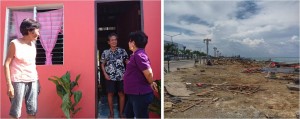
Zamboanga City – One year after this city suffered from the loss of lives, property, and the displacement of families as a result of the armed conflict between the military and the Moro National Liberation Front (MNLF)-Misuari faction, the displaced families are well on their way to recovery.
This is according to Department of Social Welfare and Development Secretary (DSWD) Corazon Juliano-Soliman, who reported in a press conference here yesterday that the Cawa-Cawa Boulevard is already free of family-evacuees as of September 5.
She said that the family-evacuees at the Cawa-Cawa Boulevard were among the 1,906 families or 10,402 evacuees from evacuation centers who were already transferred to transitional shelters.
These transitional shelters are located in the Joaquin F. Enriquez Memorial Sports Complex (JFEMSC), Tulungatung, Taluksangay, Rio Hondo, Philippine Tuberculosis Society Inc. in Upper Calarian, Mampang, Sta. Catalina (Silsilah, Paniran), and Buggoc.
On the other hand, a total of 44 families are now living at the Martha Permanent Resettlement site.
“We are targeting that all families will be transferred to transitional shelters by yearend with the 2,304 remaining families in the Grandstand to be moved to safer homes by December 15,” Sec. Soliman said.
Sec. Soliman together with Mayor Beng Climaco, and Office of Civil Defense Undersecretary Alex Pama visited the transitional sites and interacted with the families.
The families expressed their gratitude to Sec. Soliman during her visit.
“Nasa ligtas na bahay na po kami (We are now in a safe house),” exulted Rogelio Olbido, 72, with four children, who was transferred to Buggoc Transitory Site.
“Masaya na ang buhay namin dito sa Martha permanent shelter (We are happy here at Martha permanent shelter),” Teresa Maru, 33, with two kids, affirmed.
This was echoed by Lilia Fuentebella, 74, also residing at Martha Permanent Shelter.
“Salamat sa pabahay na tulong ng gobyerno. Nabago po buhay namin (Thanks to the housing provided by the government, our lives have changed),” she said.
Livelihood support
To support the households start their own livelihood businesses, the DSWD provided P9.7 million capital seed fund to some 970 families at P10,000 each.
From September to October this year, the DSWD and the local government unit will be conducting a series of entrepreneurial activities for the families at the transitional sites.
These include handsewing of baby items, vocational training of persons with disabilities, and nail care seminar, among others.
Parent Education Congress will also be held to coincide with the Family Week celebration this month, as well as Children’s Congress in October, and Family Development Sessions (FDS).
DSWD will also continue to implement Supplementary Feeding Program (SFP) in the sites to ensure the nutritional well-being of the children.
To date, a total of P363.9 million pesos worth of assistance have been provided to the the displaced families from the combined resources of the DSWD and partner-local and international organizations.
The assistance include food packs; non-food items, such as mats, malong and hygiene kits; Cash and Food for Work; financial; educational; house rental for 18 families; transportation allowance for those who availed of the Balik-Probinsya and Balik Barangay programs; shelter assistance; and construction of transitional shelters. ###


